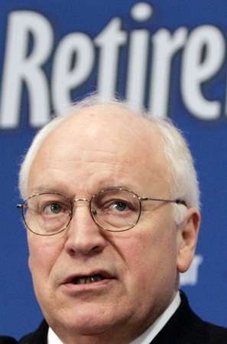published by Jonathan on Tue, 03/21/2006 - 21:14
From a recent article in USA Today by Dennis Cauchon titled "Federal aid programs expand at record rate":
A sweeping expansion of social programs since 2000 has sparked a record increase in the number of Americans receiving federal government benefits such as college aid, food stamps and health care. A USA TODAY analysis of 25 major government programs found that enrollment increased an average of 17% in the programs from 2000 to 2005. The nation's population grew 5% during that time. It was the largest five-year expansion of the federal safety net since the Great Society created programs such as Medicare and Medicaid in the 1960s. The biggest expansion: Medicaid, the health care program for the poor. It added 15 million beneficiaries over five years to become the nation's largest entitlement program. Robert Greenstein, head of the liberal Center for Budget and Policy Priorities, says the growth in the number of people in many programs is due to a rise in the poverty rate from 11.3% in 2000 to 12.7% in 2004, the most recent year available. "It's certainly better that people falling into poverty can get Medicaid, but I'd prefer fewer poor people and employers not dropping medical coverage," he says. Rep. Gil Gutknecht, a conservative Republican from Minnesota, says the number of people in entitlement programs should not be growing when unemployment is near a record low. "It's probably time to revisit food stamps and its goals and costs," says Gutknecht, chairman of the subcommittee that oversees food stamps. Food stamp enrollment climbed from 17.2 million in 2000 to 25.7 million in 2005. USA TODAY found three major causes for soaring enrollment in government programs: •Expanded eligibility
•Increased participation
•Welfare reform
The USA Today article drew criticism for being "wildly misleading." For example, from a post by Greg Anrig, Jr. on TPM Cafe titled "USA Today Buries the Lead, Botches the Rest":
Medicaid enrollments have mainly gone up because more people have fallen below the eligibility thresholds while losing health insurance at work--most states have cut back their eligibility requirements rather than make them more generous. Food stamp enrollments have mainly gone up because, again, more people have fallen below the eligibility thresholds --though some administrative changes have helped modestly. The whole story is basically a mess. For example, the front page graph shows enrollment in 25 "federal aid" programs is up 17 percent, increasing from 263 million to 307 million. That's quite something, considering that there are only 300 million U.S. citizens. Oh, right, there is a note in agate type to the effect that some people participate in multiple programs. But what then is the logic behind combining numbers for age-dependent universal programs like Social Security and Medicare, to which recipients have paid dedicated taxes, with means-tested safety net programs? And if one person falling into poverty can add three, four, or five to the enrollment count of safety net programs, disproportionate ly elevating percentage increases, how are readers supposed to begin to make sense of what that number means?
published by Jonathan on Mon, 03/20/2006 - 22:06
In a blog post, Travis Stanley hit the highlights of a lecture given by Lynn Anderson at the ACU Graduate School of Theology Alumni Luncheon in February. The full text of the speech is available on Anderson's web site. Anderson highlighted three dangers he sees for American Christianity:
CONSTANTINIANISM
I am feeling troubled over a new rising tide of what some dub "neo-Constatinianism": that is the current unholy marriage between "the conservative Christian cause" and American Nationalism, more specifically the right wing view of American economic and political interests. CONSUMERISM Add to Constantinianism the cultural drift into Consumerism. Rugged Individualism expects its inalienable rights - "Life, liberty and pursuit of happiness." But consumerism turns these into demands for "affluence, license and the pursuit of gratification." Surely it takes no Solomon to recognize that the culture can shape the church rather than the other way around. CERTAINTY Then stir another ingredient into the mix of Constantinianism and Consumerism: Certainty - the hubris that trusts its own ability to understand - and thus to "get things right, absolutely right." (In churches of Christ we know a thing or two about certainty.) This kind of Certainty stands unbowed before the ever expanding mystery of God's majesty and Holiness. And it naively reduces the rich texture of scripture down to a few rigid moral and doctrinal bullet points. In addition it seems oblivious to the baffling mystery of human persons - let alone the overwhelming complexity of global social issues.
published by Jonathan on Fri, 03/17/2006 - 22:29
You may have seen these examples of photographers framing their subjects in a way that the background makes a funny commentary on the subject.

Cheney speaking at the National Summit on Retirement Savings on March 2, 2006. (photo credit: REUTERS/Larry Downing)

Bush giving a speech in Bratislava's Hviezdoslavovo Square on February 24, 2005. (photo credit: AFP/Joe Klama)
There's a collection of funny photos of politicians (yes, both Republicans AND Democrats) at lowculture.
published by Jonathan on Sat, 03/04/2006 - 21:54
From wikipedia, a break-down of the 2006 federal budget:
The President's budget for 2006 totals $2.6 trillion. This budget request is broken down by the following expenditures:
- $544.8 billion - Social Security
- $447.4 billion - Defense
- $359.5 billion - Unemployment and welfare
- $345.7 billion - Medicare
- $268.4 billion - Medicaid and other health related
- $211.1 billion - Interest on debt
- $88.7 billion - Education and training
- $70.7 billion - Transportation
- $68.4 billion - Veterans' benefits
- $43.1 billion - Administration of justice
- $38.4 billion - Foreign affairs
- $31.2 billion - Natural resources and environment
- $26.0 billion - Agriculture
- $24.0 billion - Science and technology
- $19.1 billion - Community and regional development
- $17.8 billion - General government
- $2.1 billion - Energy
published by Jonathan on Fri, 02/24/2006 - 22:00
The other night The Colbert Report had a joke at the current administration's expense with the following twist on a common phrase:
Makes facts based on decisions.
Pages